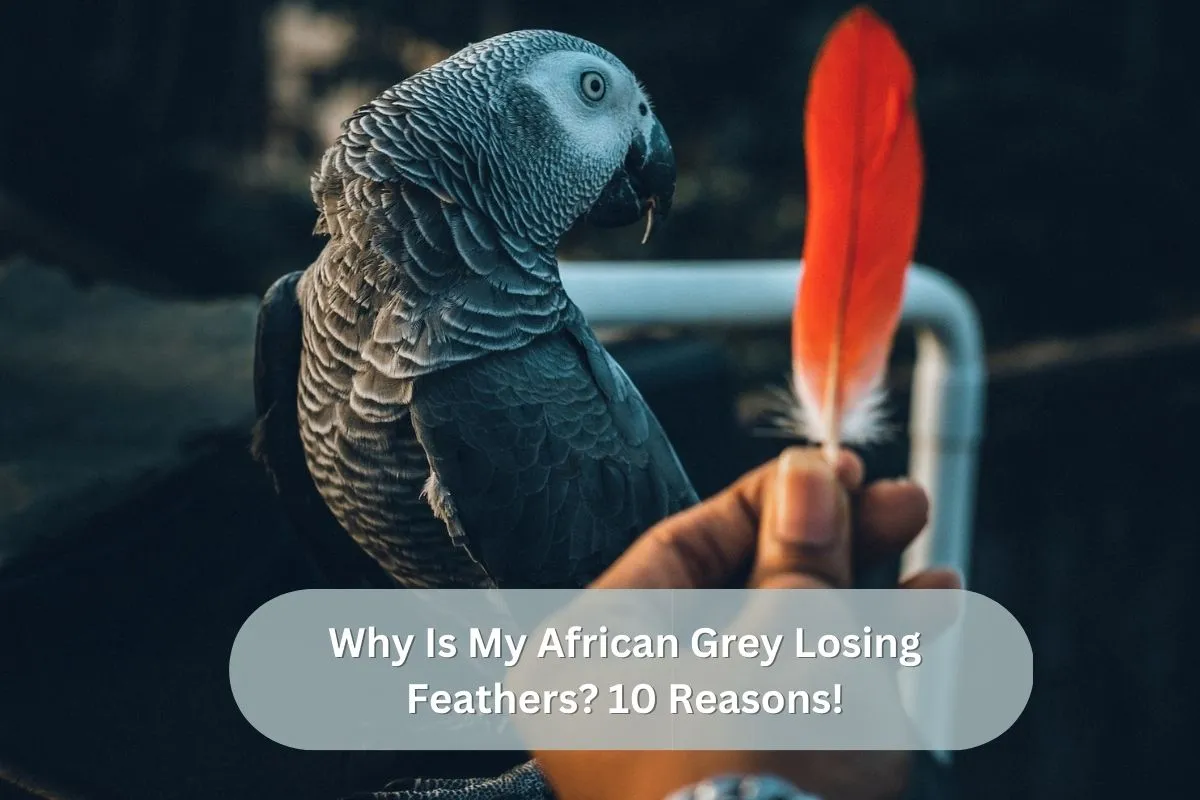If you have an African Grey, you may be wondering about why is my african grey losing feathers? There are several potential reasons why an African grey might be losing its feathers, ranging from natural processes such as molting to underlying health issues or environmental factors.
In this article, I will explore 10 potential reasons why your African grey might be losing its feathers, and what you can do to help support healthy feather growth.
1.Molting
Molting is a normal process that all birds go through to replace their old feathers with new ones. African grey parrots typically molt twice a year, usually in the fall and spring.
During this time, your bird may experience some degree of feather loss as the new feathers come in to replace the old ones.
While molting is a normal and necessary process for birds. However, if your African grey is losing an abnormal amount of feathers, it may be worth consulting with a veterinarian or avian specialist to rule out any potential underlying health issues.
2.Stress or Anxiety
Excessive stress and anxiety can also lead to feather loss in African grey parrots. This is because birds, like humans, tend to pluck their feathers when they are feeling anxious or stressed out.
If your bird is showing signs of stress or anxiety, it is important to take steps to reduce its stress level. There are several steps you can take to reduce stress or anxiety in your African grey parrot:
- Provide a comfortable and safe living environment: African grey parrots need a spacious and well-ventilated living space that is free from drafts and other potential stressors.
- Maintain a consistent routine: African grey parrots thrive on routine, so it is important to establish a regular schedule for feeding, grooming, and other activities.
- Avoid overcrowding: African grey parrots are social birds, but they also need their own space and privacy. Overcrowding or lack of personal space can be a source of stress for your bird.
- Avoid loud noises or other potential stressors: African grey parrots are sensitive to loud noises and other potential stressors, such as sudden movements or unfamiliar people or animals. It is important to create a calm and quiet environment for your bird.
- Provide a balanced diet: A healthy diet is important for the overall health and well-being of your African grey, and it can also help to reduce stress and anxiety. Be sure to provide your bird with a balanced diet that includes a variety of seeds, fruits, vegetables, and other nutrients.
- Consider behavior’s modification techniques: If your African grey is displaying behaviours such as feather-plucking or self-mutilation that may be related to stress or anxiety, it may be helpful to work with a veterinarian or avian behaviourist to develop a behaviour modification plan.
- Seek medical treatment as needed: If you are unable to address your African grey’s stress or anxiety through changes to its environment or behavioral modification techniques, it may be necessary to seek medical treatment.
3.Poor Nutrition
Nutrition is also vital in maintaining healthy feathers in an African Grey. A diet that is lacking in essential vitamins and minerals can lead to poor feather growth, as well as signs of malnutrition. Ensure your bird gets a balanced diet with lots of fruits, vegetables, and proteins.
Here’s what you can feed your African grey parrot:
- Provide a source of clean, fresh water.
- Offer a variety of seeds.
- Provide fresh fruits and vegetables.
- Consider supplementing with fortified pellets.
- Avoid giving your bird foods that are high in sugar or fat.
- Offer a calcium supplement.
- Monitor your bird’s weight and adjust its diet as needed.
4.Over-Preening Or Feather-Plucking
Over-preening or feather-plucking can also contribute to feather loss in African grey parrots. This behavior’s is often caused by boredom or stress, leading to excessive feather loss if addressed slowly.
It would be best if you tried to provide your bird with lots of enrichment activities to help reduce its desire to pluck its feathers.
5.Health Issues
Specific health issues can also cause feather loss in African grey parrots. These include mites and other parasites, fungal infections, or vitamin deficiencies.
If you notice any signs of feather loss that aren’t caused by stress or nutrition issues, it is essential to take your bird to the vet for a checkup.
Here are some common symptoms that may indicate a health issue in an African grey parrot:
- Changes in appetite: A sudden change in appetite, such as a decrease or increase in food or water intake, can be a sign of a health issue.
- Changes in behavior: African grey parrots that are experiencing a health issue may exhibit changes in their behavior, such as lethargy, aggression, or changes in their vocalizations.
- Changes in feather quality: Poor feather quality, such as thin, brittle, or discolored feathers, can be a sign of a health issue.
- Changes in droppings: Abnormalities in the appearance or quantity of your African grey’s droppings, such as changes in color, consistency, or smell, can be a sign of a health issue.
- Changes in breathing: Difficulty breathing or abnormal respiratory sounds, such as wheezing or coughing, can be a sign of a respiratory illness or other health issue.
- Changes in appearance: Swelling or changes in the appearance of your African grey’s eyes, beak, or feet can be a sign of a health issue.
6.Lack Of Sunlight Or Vitamin D
African grey parrots require a good source of natural sunlight to produce healthy, vibrant feathers. If your bird is not getting enough natural sunlight, it may develop vitamin D deficiencies that can lead to feather loss and poor feather growth.
Make sure your bird’s cage is placed near a window or skylight, or consider investing in a full-spectrum lighting system for your bird’s cage.
7.Parasites
Mites and other parasites can cause significant feather loss in African grey parrots. If you suspect your bird has mites, it is crucial to take it to the vet for a thorough examination and treatment.
Depending on the severity of your bird’s infestation, your vet may recommend topical medications or other treatments. Or you can treat at home using natural remedies such as apple cider vinegar.
8.Aging
As birds age, they naturally experience a decrease in the production of new feathers. This is why older African grey parrots may have more visible bald spots or areas with thinning feathers.
To help promote healthy feather growth in your ageing bird, provide it with lots of nutritious food and enrichment activities.
9.Breeding or Egg-Laying
Breeding or egg-laying can lead to feather loss in African grey parrots. During the breeding season or when a female African grey is preparing to lay eggs, hormone levels may increase, leading to changes in the bird’s behaviour and physical appearance.
One standard change that may occur is feather loss, particularly around the vent or cloaca area. This is due to the increased hormone levels and the physical demands of egg-laying, which can lead to increased preening and feather-plucking behaviour.
If you suspect that your African grey is experiencing feather loss due to breeding or egg-laying, it is recommended to consult a veterinarian or avian specialist for guidance. They may recommend providing additional calcium and other nutrients to support the bird’s health during this time and measures to prevent over-preening or feather-plucking behaviour. It is also important to ensure that the bird has a suitable nesting area and receives adequate rest and care during this time.
10.Environmental Factors Such As Semperature Or humidity
Environmental factors such as temperature and humidity can impact feather growth in African grey parrots. Proper temperature and humidity levels are important for African grey parrots’ overall health and wellbeing and the development and maintenance of their feathers.
If the temperature or humidity levels in a bird’s environment are too low or too high, it can affect its feather growth and quality. For example, low humidity levels can cause feathers to become dry and brittle, while high humidity levels can lead to feather damage or fungal infections. Similarly, extreme or fluctuating temperatures can also impact feather growth and quality.
It is important to maintain appropriate temperature and humidity levels in an African grey environment to support healthy feather growth. This may involve using a humidifier or adjusting the heating or air conditioning in the bird’s living space.
It is also important to ensure that the bird has access to clean water and a balanced diet to support healthy feather growth. If you are still determining the appropriate temperature and humidity levels for your African grey, it is recommended to consult with a veterinarian or avian specialist for guidance.
Did I Answer Everything You Need To Know About Why Is My African Grey Losing Feathers?
Various factors, including stress and anxiety, poor nutrition, over-preening or feather-plucking, parasites and health issues, can cause feather loss in African grey parrots. It is important to address the underlying cause of your bird’s feather loss as soon as possible to ensure its overall health and wellbeing. Additionally, make sure to provide your African grey with lots of natural sunlight and nutritious food to help promote healthy feather growth.

